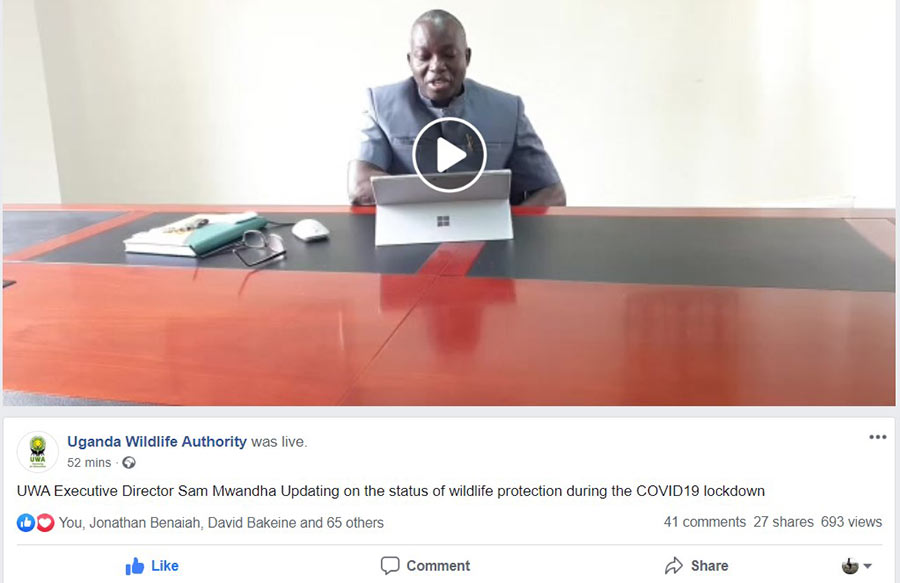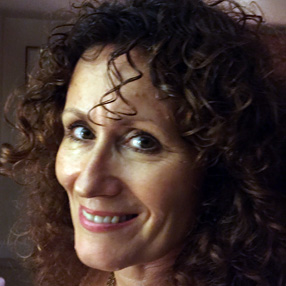
Updates about mountain gorilla permits, chimp tracking, law enforcement and primate monitoring, electric fencing projects, desert locusts in north Eastern Uganda and the future of UWA.
In his first Facebook Live press conference, UWA Executive Director Sam Mwandha shared news about the work of the Uganda Wildlife Authority during the Coronavirus pandemic.

Following President Museveni’s announcement of a lockdown across the country, gorilla tracking was suspended until 30th of April. To help tourists and tour operators who have booked gorilla (or chimpanzee) tracking permits, Uganda Wildlife Authority has relaxed their rescheduling policy, meaning permits can be rescheduled for a period of up to 2 years (that is until March 2022). This arrangement also applies to those who have paid the initial 30% deposit for permits.

Mr Mwandha confirmed that there are no cases of coronavirus in UWA staff or any other people working in Uganda’s Protected Areas. UWA have procured protective equipment for staff that includes masks, gloves and sanitiser, along with guidance on their use. He thanked Conservation Through Public Health, Uganda Conservation Foundation and others for their generosity.
Although there are currently no tourists in the Protected Areas, law enforcement patrols continue. Human wildlife conflict issues are being actively managed and wildlife and communities are still being protected. Mr Mwandha said communities should “feel free to contact Uganda Wildlife Authority if they need help with human wildlife conflict issues.”
He also confirmed that rangers are continuing daily monitoring of primates in the three Protected Areas of Bwindi Impenetrable Forest, Mgahinga and Kibale Forest.

On the issue of desert locusts, Uganda Wildlife Authority has provided 82 staff to support the UPDF with chemical spraying, in consultation with the Ministry of Agriculture, Animal Industry and Fisheries (MAAIF).
Although it was reported that locusts had entered into Pian Upe Wildlife Reserve and Kidepo National Park, Mr Mwandha reported that “whenever locusts have entered, they have left the following morning so there has been no significant damage reported.”
Update on Uganda Wildlife Authority developments across Uganda
During this period, UWA is continuing with other projects that include:
- 18 km of electric fencing in Queen Elizabeth (near Kasese) and an additional 5 km of electric fencing near Kyambura to protect communities from wild animals (predominantly elephants). In Murchison Falls, 20 km of electric fencing is being installed in Moya District and elsewhere.
- The ED of UWA gave a special thank you to Uganda Conservation Foundation, who have helped upgrade the internet. “Thanks to UCF they have high-speed Internet in the newly constructed operations centre at Murchison Falls. This centre will support law enforcement in MFNP.“ The internet and centre are both operational (and were supposed to have been launched a week ago). “They will help deal strongly and resolutely with poaching in Murchison Falls and stamp it out completely.”
- Over 200 rooms are being built for staff across the conservation areas and these are expected to be ready starting July 1st.
“I want to assure staff and partners that we are confident that Uganda Wildlife Authority will survive.”
Sam Mwandha rounded off his presentation by saying that with no tourism revenue coming in “the days ahead are going to be hard for UWA.”
According to UWA’s Business Continuity Plan, even in a worst-case scenario (of no revenue, indefinitely) the organisation has committed to keeping key functions running until July 2021.
Mr Mwandha made three specific assurances of how things will be between now and July 2021. UWA will ensure that:
- Security of employment of staff is maintained.
- Wildlife and Protected Areas are protected from poaching and encroachment.
- Human wildlife conflict that affects our communities is minimised.
He ended by saying “We continue needing support until tourism returns to normal.” He thanked AUTO (Association of Tour Operators)* for their “donation of items important for patrols. These have been immediately despatched to the parks for the rangers as they continue protecting our wildlife.”
“We request all of you Ugandans, partners and stakeholders to work with us to keep COVID-19 out of Uganda by observing the guidelines provided and that together we conserve for future generations.”
Read UWA’s public statement on measures to contain COVID-19 in the Protected Areas, dated March 25th 2020.
The Muzungu adds:
It’s reassuring to hear Uganda Wildlife Authority’s commitments during this difficult time. We know from firsthand experience of living at Sunbird Hill how they are continuing their work in the field. Last week we heard gunshots in the air as they chased elephants back into Kibale Forest (to protect villagers’ crops). We also interacted with UWA when a chimpanzee was killed by other chimpanzees on the forest edge.
Between 2009 and 2011 I was a Voluntary Service Overseas volunteer with the Uganda Conservation Foundation so it’s fantastic to see how they’ve expanded their support of UWA across the country. My role with UCF was to help fundraise to build ranger accommodation in Queen Elizabeth and to equip UWA with boats and training for them to police the park’s lakes and rivers to intercept poachers.


I was over the moon when UWA invited me to run a digital marketing training programme for tourism wardens in Entebbe (my last project before lockdown in fact). With all this time on our hands, I hope all our trainees are home practising their Facebook skills!
Also this week, AUTO held a series of brainstorming sessions online. These can be accessed on the AUTO YourTube channel or on SoundCloud.
UPDATE DECEMBER 2020: all National Parks, Wildlife Reserves and primate tracking have reopened with COVID-19 protocols in place. UWA have a wide range of promotions in place.


























The Uganda Tourism Board was the first tourism organisation to take to Facebook Live to communicate with stakeholders, using the hashtag #TourismKonnect. We are following discussions and watching developments closely.
At least with this update from UWA, the Tourism sector in Uganda can see some light at the end of the tunnel after this COVID-19, Pestilence. As we continue to pray daily to our Heavenly Father to humbly come before us and sustain us by his mercy, grace and power. We also continue to trust in his gracious promise that ”no weapon that is fashioned against” us, our families, our churches and all his other creations like Wildlife ” shall succeed.” I also add my simple call to all Ugandans, Partners and all Stakeholders in the Tourism industry to work closely with all the relevant Authorities to ensure that this COVID -19 pandemic is kicked out of Uganda and the world at large, by keenly observing all the provided guidelines by the peoples’ respective Governments and Medical personnel and that we all together conserve our future generations.
#RIPRafiki
On 12th June 2020, we were appalled to learn of the killing of Rafiki, the Silverback mountain gorilla from Nkuringo, southern sector of Bwindi Impenetrable National Park.
This is the reality of the pandemic… less people in the parks (tourists, guides, rangers and researchers) means more opportunities for poachers. Poaching is real, and this is the first mountain gorilla to have been killed by poachers for many years.
With no tourism, there is no ‘trickle-down effect’ to the boda boda [motorbike] drivers and rolex-makers who are – let’s be honest – the key workers of Ugandan society.
We cannot reopen primate tourism for a long time (not until 2021 in my view) but we need more vigilance than ever in Bwindi, Queen Elizabeth (where poaching is also on the increase) and all the National Parks, Wildlife and Forest Reserves. (Do not buy or consume bushmeat).
Can our wildlife survive this pandemic? Can our trees outlive it? Here in the village adjacent to Kibale National Park, our neighbours cut their mango tree last week to make charcoal! The tree would have been at least twenty years old. Mango trees are famous for the dark shade they offer. Mature trees are a whole ecosystem for numerous species.
We have to think long-term. This pandemic is here indefinitely and things are going to get even tighter, especially for wildlife and the environment, the cornerstones of our tourism and of our very futures.
Friends – we must think of tomorrow!